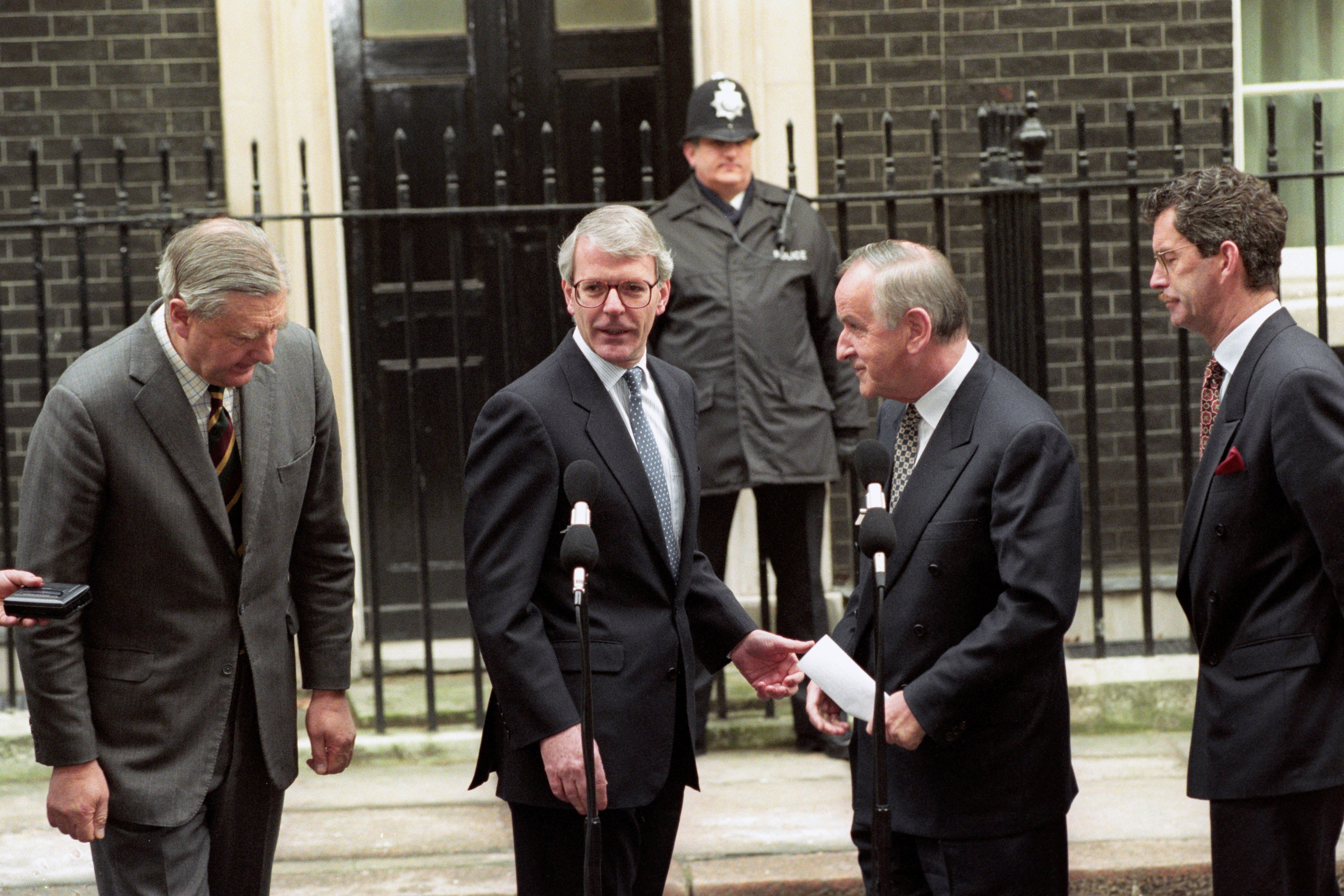Unionists should realise Ireland is not ruled by Rome, Taoiseach told Major
The comments were made at a meeting between Albert Reynolds and British Prime Minister John Major at a meeting in Downing Street on 16 June 1993.

Your support helps us to tell the story
From reproductive rights to climate change to Big Tech, The Independent is on the ground when the story is developing. Whether it's investigating the financials of Elon Musk's pro-Trump PAC or producing our latest documentary, 'The A Word', which shines a light on the American women fighting for reproductive rights, we know how important it is to parse out the facts from the messaging.
At such a critical moment in US history, we need reporters on the ground. Your donation allows us to keep sending journalists to speak to both sides of the story.
The Independent is trusted by Americans across the entire political spectrum. And unlike many other quality news outlets, we choose not to lock Americans out of our reporting and analysis with paywalls. We believe quality journalism should be available to everyone, paid for by those who can afford it.
Your support makes all the difference.Albert Reynolds told John Major that Ireland is “not ruled by Rome”, during a meeting in which the Irish side expressed frustration at the attitude of unionists to talks on Northern Ireland
According to a confidential document, the comments were made at a meeting between Mr Reynolds and the British PM in Downing Street on 16 June 1993.
After that meeting, both called for talks between Northern Ireland political parties to resume.
Behind closed doors, Mr Reynolds vented his frustrations with Ulster Unionist Party leader Jim Molyneaux.
He said: “I have always had reservations about Jim Molyneaux. Looking at the situation from his perspective, what is in it for him?
“However, he has some very good people behind him. How can we harness them to support resumption of talks?”
In a later exchange, Tanaiste Dick Spring admits he is worried up the upcoming European elections, warning: “[Ian] Paisley will start campaigning but there is no real benefit in this for the people in Northern Ireland.”
Mr Reynolds picks up the conversation: “The Unionists feel they are under siege. Also, there is fear of demographic changes. Genuine people want to talk but fears are there.”
According to the memo, Mr Major tells the Irish delegation: “A large part of the Catholic population would not vote for a united Ireland – that is what is said.
“The question is how do we carry the Unionists? We can take them warmly by – or try to persuade them to talk. We could see say to them we will see you alright (from a Parliamentary perspective) but we have not. What can we do?”
Mr Major suggests that the Taoiseach or the Tanaiste should make another speech to address the worries of unionists, referring positively to a recent speech given by Mr Spring.
The Secretary of State for Northern Ireland Patrick Mayhew urges Mr Reynolds to do the same, pointing to unionist concerns regarding articles two and three of the Irish Constitution and the recent judgment of the Irish Supreme Court in the “McGimpsey case”, which saw a challenge to the legality of the Anglo-Irish Agreement.
The two articles were seen as making a territorial claim to Northern Ireland.
Mr Reynolds responds: “Until there is something on the table, the question of constitutional change will not arise.”
He continues: “Articles 2 and 3 have not been raised in this way before the McGimpsey case. Symbols are also important.”
According to the note of the conversation, Mr Reynolds said that the Government’s handling of the closure of the Adelaide Hospital in Dublin, which fuelled concerns over how the institution’s Protestant ethos would be protected, should send a message to unionists.
“We are not ruled by Rome ” he said.
At the same meeting, Mr Spring vented irritation at the position of unionist leaders.
“The Unionists would be far better to negotiate from a position of strength. We are ready to talk to them. It was irresponsible for politicians not to come to the table.”
Mr Mayhew says that “their leaders do not feel able to take an imaginative step” and singles out Mr Molyneaux.
“I want to mobilise public opinion. In Northern Ireland, politicians are considered to be a priestly class – guardians of the temple. I have been strongly criticised for saying that I would go over the heads of the politicians.”
Towards the end of the meeting, Mr Major says: “I spoke to a person on the occasion of my recent visit to Northern Ireland who said that if the talks don’t make any progress, I should ask people to vote on a united Ireland.
“They may say ‘yes’ or ‘no’. But suppose there is no progress and the two Governments don’t get closer, then give us a referendum to enable us to become more closely integrated into the UK. We will have to do what we can.
“It will essentially be a mix of things. Courage will be required. From their own objective (Unionists) they are on a one-way street.
“Soft words are required from us, soft action from you.”
The material can be viewed in the National Archives in file 2021/95/21.